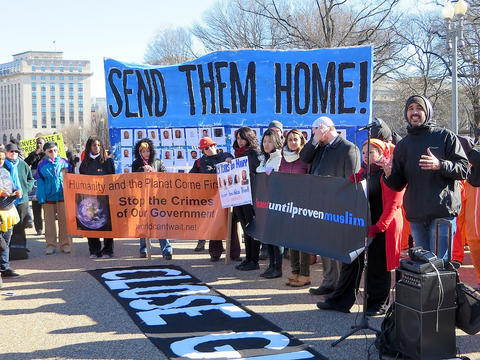Majority of Americans Think Remaining Guantánamo Prisoners Should Be Tried Or Released

Campaigners calling for the closure of Guantánamo outside the White House on January 11, 2016, the 14th anniversary of the opening of the prison. Addressing the crowd on the right of the photo is Enmanuel Candelario of The Peace Poets, Bronx-based spoken word artists. (Photo: Andy Worthington, via Flickr).
By Andy Worthington, August 30, 2016
On August 16, after President Obama released 15 men from the prison at Guantánamo Bay (the largest single release of his presidency), a YouGov poll found that a majority of U.S. citizens think that the remaining Guantánamo prisoners — 61 men in total — should either be tried or released.
YouGov's polling found that 52% of Americans think that the remaining 61 men "should either be put on trial for terrorism or should be released," while only 20% think that they should continue to be held without charge. 28% of those polled were not sure what to think.
Asked whether opening Guantánamo was a mistake in the first place. 34% said it was a mistake, while 37% said it was not. As YouGov put it, "Democrats tend to say it was a mistake (45% to 21%) but Republicans overwhelmingly do not think it was a mistake (66% to 10%)."
The results regarding whether or not prisoners should continue to be held strike us as significant, demonstrating an important recognition by a majority of Americans that indefinite imprisonment without charge or trial — the heart of the novel lawlessness of Guantánamo when it opened in January 2002 — is unacceptable, and that those still held should either be charged or released.
This does not quite equate to a call for Guantánamo to be closed, as the prison could remain open for trials by military commission (which only ten of the 61 men still held are facing, or have faced), but we regard it as an important development, because, for many years now, polls have shown that the U.S. public has failed to understand how necessary it is for Guantánamo to be closed — for reasons that we explained in our mission statement when we launched the Close Guantánamo campaign and website in January 2012.
As we described it, "Guantánamo harms our nation every day it stays open, and it continues to serve as a potent symbol for terrorist recruitment." We also stated, "Guantánamo also undermines our bedrock commitment to the rule of law, making that fundamental principle less secure for all Americans."
Just six months ago, at the start of March, a CNN/ORC poll found a majority of Americans still supporting keeping Guantánamo open. In that poll, 56% opposed President Obama’s intention to shut the prison, with just 40% supporting the idea, while in July 2015 a YouGov/Huffington Post poll found that 50% supported keeping Guantánamo open, while just 27% thought it should be shut down.
Opposition to the closure of Guantánamo has, unfortunately, been consistent throughout the Obama presidency apart from the first year. In January 2009, when Barack Obama became president for the first time, a Washington Post-ABC News poll found that 53% of Americans wanted to see Guantánamo closed, while only 42% wanted it to stay open. However, by November 2009, according to polling by the Pew Research Center, although 59% of Democrats still supported the closure of the prison, only 39% of those polled overall approved of closing it — because just 18% of Republicans supported its closure.
By February 2012, support for Guantánamo’s closure had fallen significantly. An ABC News/Washington Post poll found that 70% of those polled supported keeping Guantánamo open — results that consisted of 61% approval by Democrats, and 79% by Republicans.
None of these findings, however, compare to the approval for Guantánamo in its earliest days, when the U.S. public was bombarded by false claims by senior Bush administration officials that the prison held "the worst of the worst." Shortly after Guantánamo opened, a CNN/USA Today/Gallup poll, conducted between January 25 and 27, 2002, found that, at the time, "[t]he vast majority of Americans, 72%, believe[d] the U.S. treatment of al Qaeda and Taliban fighters at the American naval base in Guantánamo Bay, Cuba, ha[d] been acceptable. Only a handful, 4%, consider[ed] it unacceptable, while one-quarter [we]re uncertain."
With less than 150 days remaining until the end of the Obama presidency, we hope that lawmakers in particular are paying attention to what the public think, as Congress is the main obstacle to the prison’s closure, with lawmakers having repeatedly passed legislation preventing the administration from bringing any prisoners from Guantánamo to the U.S. mainland for any reason, thereby preventing the prison’s closure.
Certainly, encouraging noises are still coming from the administration. Last week, on a visit to Sweden, Vice President Joe Biden said he expected Guantánamo to be closed before he and President Barack Obama leave office in January. "That is my hope and expectation," he told a news conference, while, at a news briefing in Washington, D.C., White House spokesman Josh Earnest said, "We're going to do our best to try to get this [Guantánamo] closed."
To add to their hopes, it was also reported last week that the cost of holding each prisoner at Guantánamo has now risen to nearly $6m per man, which can only help President Obama make his case to Congress that the cost of maintaining Guantánamo has become prohibitively expensive, and the remaining prisoners must be moved to the U.S. mainland so that Guantánamo can be closed once and for all.




